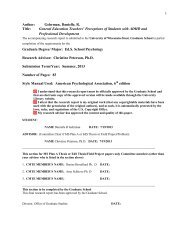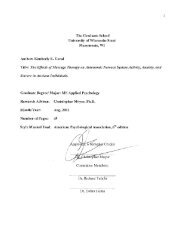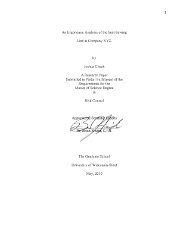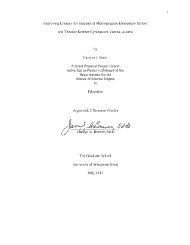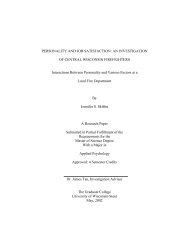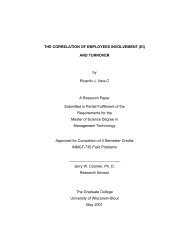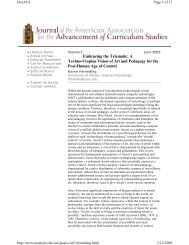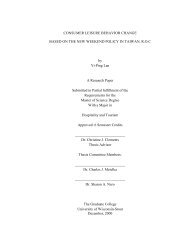A Review of the Literature on Three Types of Disenfranchised Grief ...
A Review of the Literature on Three Types of Disenfranchised Grief ...
A Review of the Literature on Three Types of Disenfranchised Grief ...
You also want an ePaper? Increase the reach of your titles
YUMPU automatically turns print PDFs into web optimized ePapers that Google loves.
was calling <str<strong>on</strong>g>the</str<strong>on</strong>g> shots and made it clear I was an outsider" (p. 213). Scott (2000) found that if <str<strong>on</strong>g>the</str<strong>on</strong>g><br />
surviving ex-spouse had remarried, <strong>on</strong>ly 43% <str<strong>on</strong>g>of</str<strong>on</strong>g> new spouses showed c<strong>on</strong>cern or sympathy<br />
following <str<strong>on</strong>g>the</str<strong>on</strong>g> death. O<str<strong>on</strong>g>the</str<strong>on</strong>g>rs showed jealousy, anger, and c<strong>on</strong>fusi<strong>on</strong> over <str<strong>on</strong>g>the</str<strong>on</strong>g> survivor's grief, and<br />
some merely exhibited a lack <str<strong>on</strong>g>of</str<strong>on</strong>g> interest. Some new spouses were initially supportive but<br />
became jealous and resentful as time went by. This is an example <str<strong>on</strong>g>of</str<strong>on</strong>g> grief becoming<br />
disenfranchised over time. Bereaved ex-spouses also repOlted not being afforded any time <str<strong>on</strong>g>of</str<strong>on</strong>g>f<br />
from work, and feeling unable to access alternative sources <str<strong>on</strong>g>of</str<strong>on</strong>g> social SUppOlt such as church<br />
(Doka, 1986). In many cases, <str<strong>on</strong>g>the</str<strong>on</strong>g> presence <str<strong>on</strong>g>of</str<strong>on</strong>g> mutual children made <str<strong>on</strong>g>the</str<strong>on</strong>g> bereavement situati<strong>on</strong><br />
even more complicated and difficult for <str<strong>on</strong>g>the</str<strong>on</strong>g> surviving spouse. Some survivors felt hmt because<br />
<str<strong>on</strong>g>the</str<strong>on</strong>g>y believed that <str<strong>on</strong>g>the</str<strong>on</strong>g>ir children's reacti<strong>on</strong>s to <str<strong>on</strong>g>the</str<strong>on</strong>g> death were ei<str<strong>on</strong>g>the</str<strong>on</strong>g>r too modest or too extreme.<br />
O<str<strong>on</strong>g>the</str<strong>on</strong>g>r survivors were faced with disapproval from children who believed that <str<strong>on</strong>g>the</str<strong>on</strong>g>ir reacti<strong>on</strong>s<br />
were inappropriate. Doka (1986) suggested that <str<strong>on</strong>g>the</str<strong>on</strong>g> inability to palticipate in meaningful<br />
mOlU"ning rituals and a lack <str<strong>on</strong>g>of</str<strong>on</strong>g> family SUppOlt serve to inhibit emoti<strong>on</strong>al expressi<strong>on</strong> and<br />
ultimately complicate and block <str<strong>on</strong>g>the</str<strong>on</strong>g> grief <str<strong>on</strong>g>of</str<strong>on</strong>g> ex-spouses.<br />
Bereaved ex-spouses comm<strong>on</strong>ly feel c<strong>on</strong>fused about <str<strong>on</strong>g>the</str<strong>on</strong>g>ir ambiguous mourning role.<br />
Many feel obligated to visit, attend <str<strong>on</strong>g>the</str<strong>on</strong>g> memorial service, or provide support, but feel<br />
uncomfOltable, uncertain, or unwelcome. Many feel <str<strong>on</strong>g>the</str<strong>on</strong>g>y are unable to publically mourn unless<br />
<str<strong>on</strong>g>the</str<strong>on</strong>g>y provide an explanati<strong>on</strong> for <str<strong>on</strong>g>the</str<strong>on</strong>g> divorce. At <str<strong>on</strong>g>the</str<strong>on</strong>g> funeral, surviving ex-spouses repOlted<br />
feeling excluded, uncomfortable, angry, and out <str<strong>on</strong>g>of</str<strong>on</strong>g> place, palticularly if <str<strong>on</strong>g>the</str<strong>on</strong>g> deceased pers<strong>on</strong> had<br />
a new spouse (Doka, 1986; Scott, 2000). A participant in Doka's 1986 study said <str<strong>on</strong>g>the</str<strong>on</strong>g> following<br />
about her experience at her ex-husband's funeral: "I felt angry that she, <str<strong>on</strong>g>the</str<strong>on</strong>g> new wife, was in <str<strong>on</strong>g>the</str<strong>on</strong>g><br />
chair reserved for <str<strong>on</strong>g>the</str<strong>on</strong>g> wife. 1 kept saying, 'where do I bel<strong>on</strong>g'." Even friends and relatives didn't<br />
lmow what to do-who to go to, who to kiss first (p. 446). Scott (2000) found that 60% <str<strong>on</strong>g>of</str<strong>on</strong>g> her<br />
33



